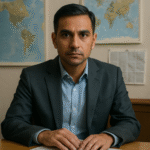New Delhi, August 10: A policy change in Washington, announced with little fanfare but heavy implications, has rattled India’s technology workforce. The shift concerns the H-1B visa programme, the lifeline through which tens of thousands of Indian engineers and managers have built careers in the United States. On paper, the change is procedural. In reality, it touches the futures of families, the stability of multinational operations, and the balance of talent between two nations.
A Quiet Policy, A Loud Impact
In Bengaluru’s Electronic City, news of the change spread faster than any official statement. At lunch counters outside sprawling IT campuses, conversations turned from product launches and cricket scores to rumours about who might be forced to return from the US. “I have a cousin in California. His project got extended, but now no one knows if he’ll even get the visa renewal,” said one mid-level developer at Infosys, shaking his head.
The numbers explain the nervousness. Indian nationals account for 72.3 percent of all H-1B holders, as per data cited by Immigration.net. That dominance is visible at the very top of American technology Satya Nadella at Microsoft, Sundar Pichai at Google, and Shantanu Narayen at Adobe. The new rules do not name them, but their rise is a reminder of what is at stake for the next generation.
Offshore Hubs Hold The Fort
It is not just individual careers that hang in the balance. US firms employ over five million people in India, operating from 1,800 offshore offices that form the backbone of cloud support, data services, and software development. Bengaluru and Hyderabad are the flagship hubs, where lights burn through the night to keep American systems humming.
According to the American Chamber of Commerce in India, these arrangements have long been both cost-effective and operationally efficient. Any tightening of visa access could push even more work offshore, keeping the jobs in India but potentially shrinking the onshore presence that many professionals aspire to.
The Bottleneck Problem
For many, this moment feels like déjà vu. The green card backlog, which leaves skilled workers in a queue for years sometimes decades has already tested patience and career planning. If H-1B approvals become harder to secure, experts warn the queue could slow to a crawl.
An analyst quoted by Immigration.net framed it bluntly: “When more than 70 percent of a visa category comes from one country, the policy risk is enormous. This is not just about tech talent. It’s about which countries win the innovation race.”
What A Reverse Migration Might Look Like
Some Indian startup founders are already speculating about a reverse migration wave. If the US window narrows, they argue, India’s own startup scene could gain an influx of experienced engineers and managers trained in the most competitive tech market in the world. That could, in theory, accelerate progress in sectors like artificial intelligence, enterprise software, and semiconductors.
Yet veterans of previous downturns sound a note of caution. A flood of senior talent returning at once could overwhelm local hiring, depress salaries, and create mismatches between skills and available roles. Not every returnee will find a landing pad that matches their US trajectory.
A Question Of Diplomacy As Much As Economics
This is not a story Washington and New Delhi can leave to market forces. The H-1B programme has quietly supported the Indo-US partnership for decades, building personal and corporate ties that extend well beyond technology. It features in nearly every high-level bilateral dialogue, even when not explicitly on the agenda.
Should the US persist with a tighter stance, India may seek stronger mobility pacts with other destinations the UK, Canada, Australia to safeguard opportunities for its skilled workforce. But the loss of a clear, reliable pathway to the US would still sting, both symbolically and economically.
For now, details are still trickling out, and companies are keeping their official statements vague. But inside India’s tech hubs, the reaction is anything but muted. People are already recalculating career plans, family decisions, and in some cases their definition of where “home” will be in the next five years.
Stay ahead with Hindustan Herald — bringing you trusted news, sharp analysis, and stories that matter across Politics, Business, Technology, Sports, Entertainment, Lifestyle, and more.
Connect with us on Facebook, Instagram, X (Twitter), LinkedIn, YouTube, and join our Telegram community @hindustanherald for real-time updates.
Specializes in South Asian geopolitics and global diplomacy, bringing in-depth analysis on international relations.






